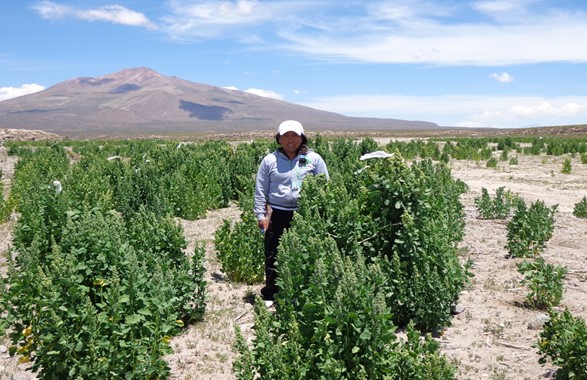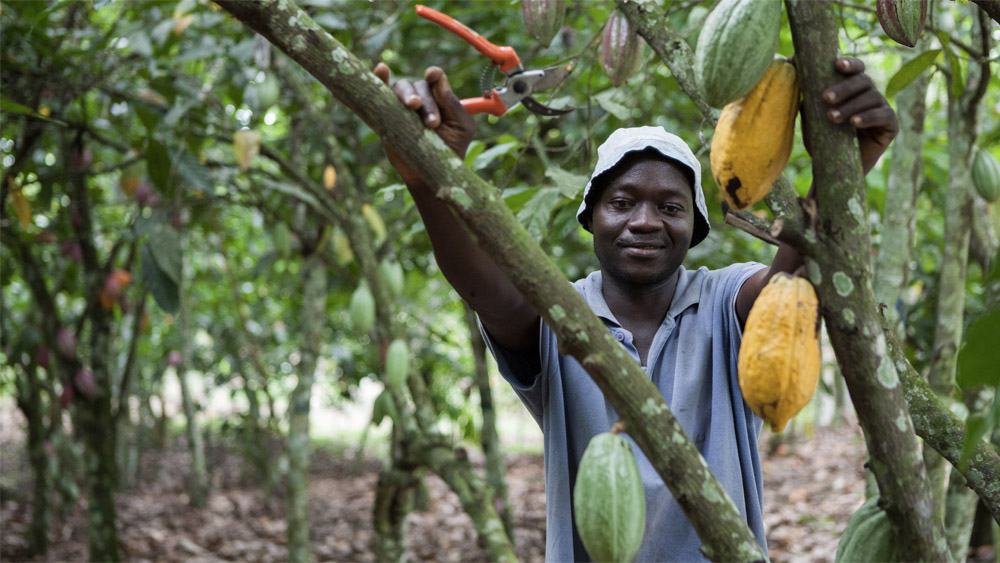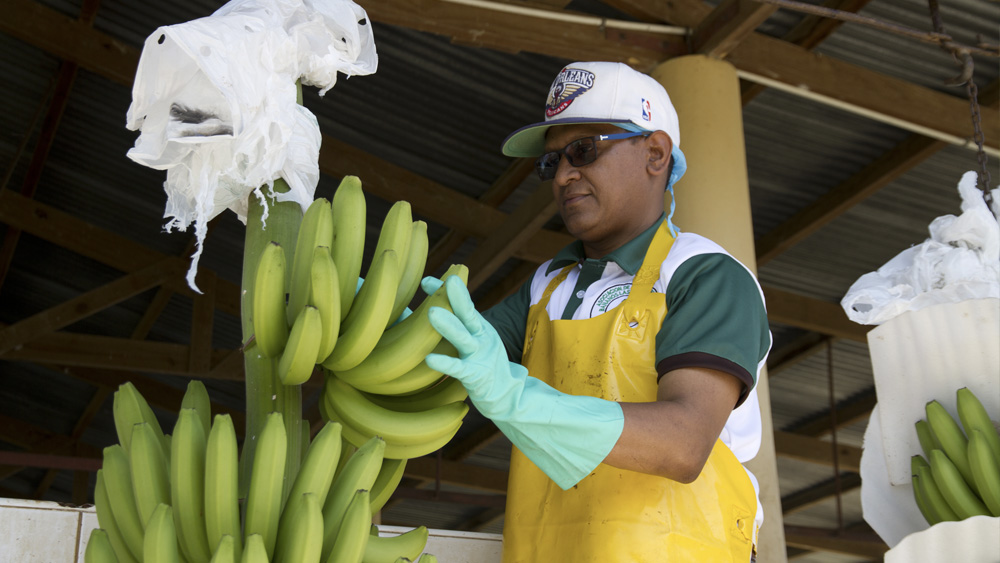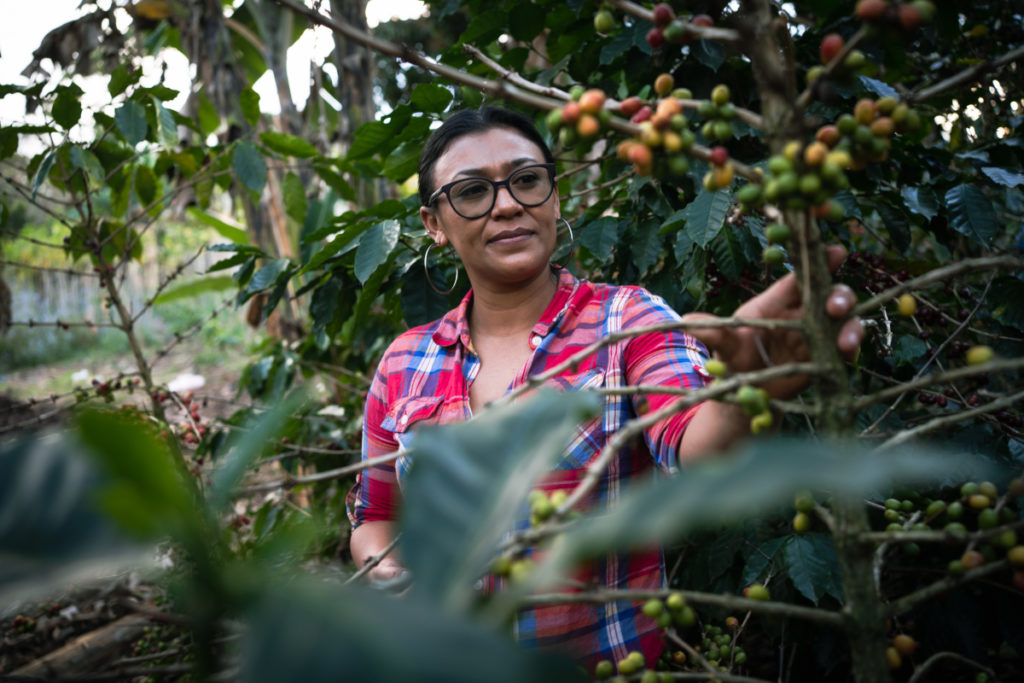Coffee, bananas and chocolate and many other foods we love come from small farms in countries already badly affected by climate change.
But by making the small switch to Fairtrade when we shop, we can all support farmers through the climate emergency.
This is because fairer prices and Fairtrade Standards help to build stronger farms and communities. More money means more capacity to adapt.
Here are five inspiring ways farmers and Fairtrade together are tackling the effects of climate change.
1. Fairtrade training young people in climate leadership

Leadership schools run by Fairtrade are already seeing success in empowering women in West Africa. For South America and the Caribbean, the focus is on young people and the climate crisis.
Since 2018, young people have graduated as climate leaders and started to pass on their skills in their communities. They have learnt ways to make their voices heard, such as public speaking and leadership techniques.
I have been trained as a leader in the face of climate change, it has been a very important issue for us. We have also learned about the importance of leadership in our networks, in our organisations and as young people we have committed to undertaking new challenges.
Irene Huarachi Arcayne, a producer at the National Association of Quinoa Producers (ANAPQUI)
2. Cocoa farmers planting trees to protect crops and soil

Most of the world’s cocoa is farmed in West Africa. As the climate becomes increasingly hot and wet, farmers are finding it harder and harder to keeping the cocoa trees cool and shaded enough to bear fruit.
In 2020, Fairtrade worked in partnership with Ben & Jerry’s and their cocoa trader, Barry Callebaut, to plant 40,000 shade trees on cocoa farms. It benefited over 5,000 farmers.
The trees now:
- Act as protection for cocoa plants and help them grow
- Boost soil fertility with their shed leaves
- Slow down soil erosion
- Make the farm more attractive to pollinators.
Helping the trees leads to bigger and more reliable harvests, which means more income and therefore more resilient farmers too.
3. Coffee farmers switching clean energy powered by coffee husks
With support from Fairtrade, coffee farmers in Kenya were able to switch to an alternative energy source that was clean, green and powered by caffeine!
It came in the form of 1,000 improved cookstoves. These energy-efficient stoves burn charcoal or briquettes, using less fuel.
Even better, the farmers are now using waste husks from the coffee drying process to make briquettes. This project has seen a 60 percent reduction in the amount of firewood used among coffee farming households, saving time for women who would have to search for it.
4. Banana farmers investing in irrigation

For farmers in the Caribbean who depend on rainfall to irrigate their crops, increasingly unpredictable weather is disastrous.
One way to control the water that reaches their crops is more effective irrigation systems. But when the price you get for your bananas keeps falling, there’s no spare money for these projects.
I feel satisfied with these programs, because if they didn’t exist, maybe our farms wouldn’t be sustainable.
Juan Liriano, banana farmer, Las Mercedes co-op, Dominican Republic
For Fairtrade farmers in the Las Mercedes co-operative in the Dominican Republic, there is a fund, through the Fairtrade Premium (an extra sum of money Fairtrade co-operatives receive). It is designed to help farmers to put in or upgrade their irrigation systems, so that their incomes from bananas are better protected.
5. Fairtrade funding resilience to climate change
The farmers in Las Mercedes, like many others, can adapt their farms and change their techniques to respond to the changing climate. But they know that eventually, a bigger disaster will strike – such as flooding or a hurricane.
When such disasters occur, the farmers’ supply chains can’t wait for the produce and have to source from elsewhere. This leaves the farmers without a safety net in deep trouble.
At the Las Mercedes Fairtrade co-operative, the farmers have set up a fund, where they put aside money from the Fairtrade Premium in case the worst happens.
Thanks to the fund I have been able to continue to cultivate my land
Banana farmer Ángel Guzmán Santana
After any natural disasters, farmers can access the fund and begin the process of picking themselves up and starting again. An example of true resilience.
Choosing Fairtrade is choosing to stand with farmers facing climate change and bringing us closer to the fairer world we want.
Updated: February 2023
